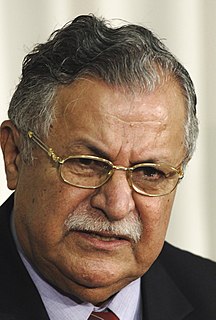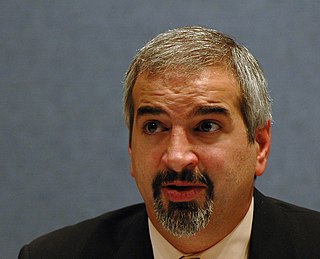A Quote by Jalal Talabani
I always tell the Kurds who defend independence: Let's say we declared the independent Kurdish state and Syria, Iran, Iraq and Turkey imposed sanctions on us, without waging a war. How would we survive under those circumstances?
Related Quotes
I do believe that the Kurds are in a difficult situation. They do have some American support. How consistent that will be is unclear. But they have built up a strong military, and they have begun to build the institutions of an autonomous life in Northern Syria. Turkey's enmity towards the Kurds and their desire to make sure there is no independent Kurdish state or even really autonomous enclave is going to push the Kurds into Bashar Assad's hands over time.
Turkey's relations with its immediate neighbors are improving. They were pretty bad for a long time - with Syria they were abominable, and with Iran they were pretty bad. In both cases Turkey sees potential for trade, especially with Iran, where it gets a lot of natural gas. In good times Iran and Turkey find mutually profitable objects of exchange, but with Syria things have been very bad; Syria doesn't have much money and never will.
The Kurds know that they won't achieve their own state by force of arms but through international recognition. And they have certainly heard what the German foreign minister said in connection with the arms deliveries: There is no Kurdish state. But that shouldn't prevent the Kurds from continuing to develop their own institutions. Still, the best thing for them would be to remain a part of Iraq, but in return we must treat them with respect - their nationality, their language and their culture.
Most Turkish Kurds want a quiet life and improved economic conditions. But the Kurdish regions of Turkey are mountainous; they're ill-favored climatically; they're poor; and there's a limit to what the government can do there without wasting a lot of resources. Developing the south east may mean decamping a large part of its population. But the thing that will improve the lot of the Kurds more than anything else will be the stabilization of Iraq in the first place, because then the Turkish southeast stops being a dead end. It can become a bridge, with trade flowing in both directions.
The Kurds had always had a bad time. They were oppressed by the Ottoman empire. Then, at the end of the First World War, they were promised a homeland, but the new Turkish state refused to give them any land, while the British went and created the new state of Iraq and sent aircraft to bomb the Kurds there into submission.
We've seen in Europe after the recent terrorist attacks a certain retrogression in human rights. It depends on how threatened the Turks feel. For example, Turkey became much more tolerant towards Kurdish nationalists when the killing of Turkish soldiers stopped in southeastern Turkey and body bags stopped arriving. Now, since June there's been a revival of Kurdish attacks on Turkish troops - something like 150 people have been killed by terrorists supplied from and operating out of bases in northern Iraq. So Turks are feeling much less tolerant of Kurdish nationalism.
WASHINGTON - Ever since President Obama ordered American warplanes to begin bombing terrorist targets in Iraq and Syria last year, members of Congress have insisted on having a say in the matter. The president, they declared, could not, or at least should not, take the country back to war without the input of the nation's elected representatives.
Tell the British people if the Iraqis are subjected to aggression or humiliation they would fight bravely. Just as the British people did in the Second World War and we will defend our country as they defended their country each in its own way. The Iraqis don't wish war but if war is imposed upon them - if they are attacked and insulted - they will defend themselves. They will defend their country, their sovereignty and their security.
Now the world believes in Kurds, as they have become partners in that region. The West doesn't believe in the Iraqi government - not in Maliki before or Abadi today. It doesn't believe in Syria in any way, nor in Iran. So the Kurds could maybe work together with the Western world to bring stability to the region. It's a nice change, coming as it is after hundreds of years of the struggle of the Kurds.
































